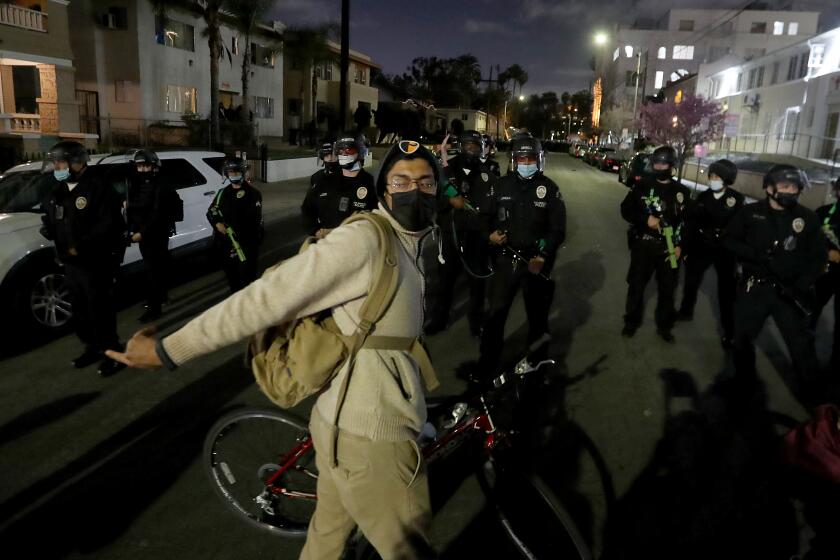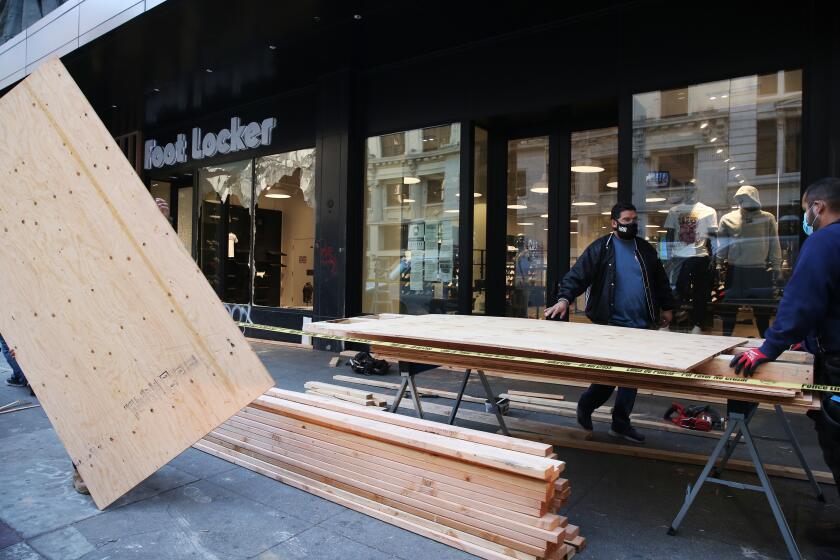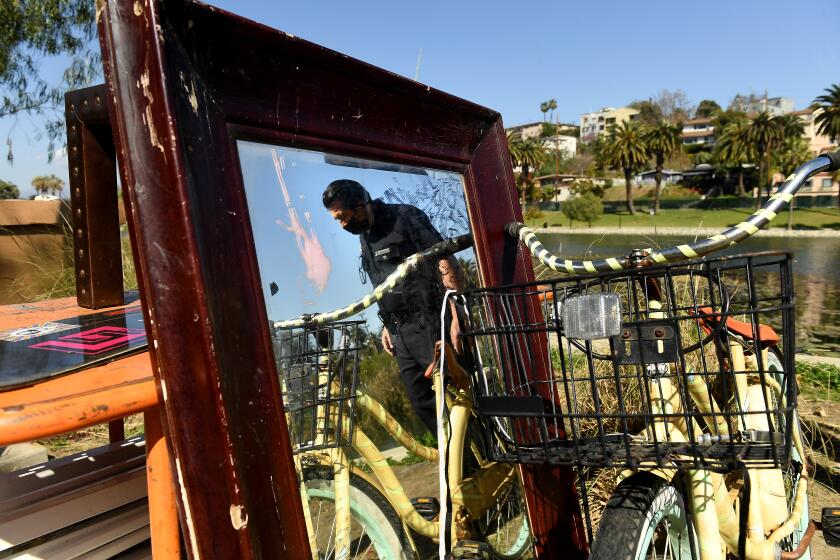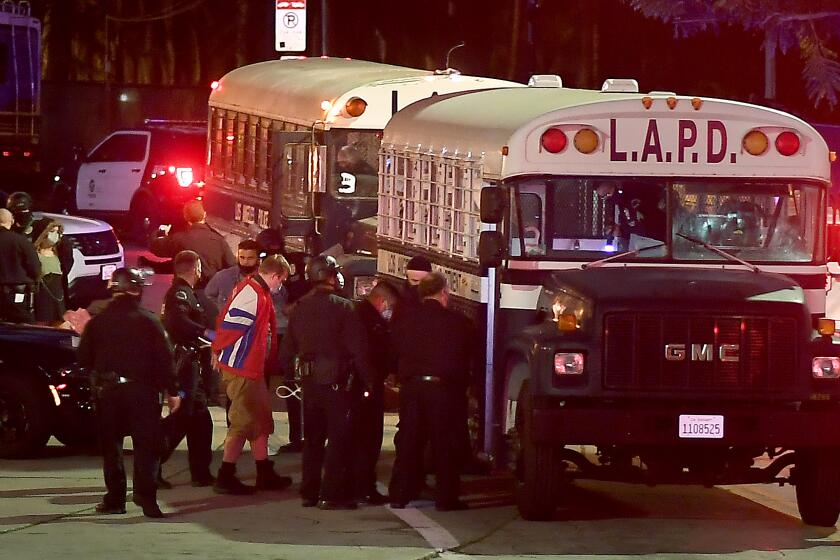L.A. officials want answers about police rollout at Echo Park Lake
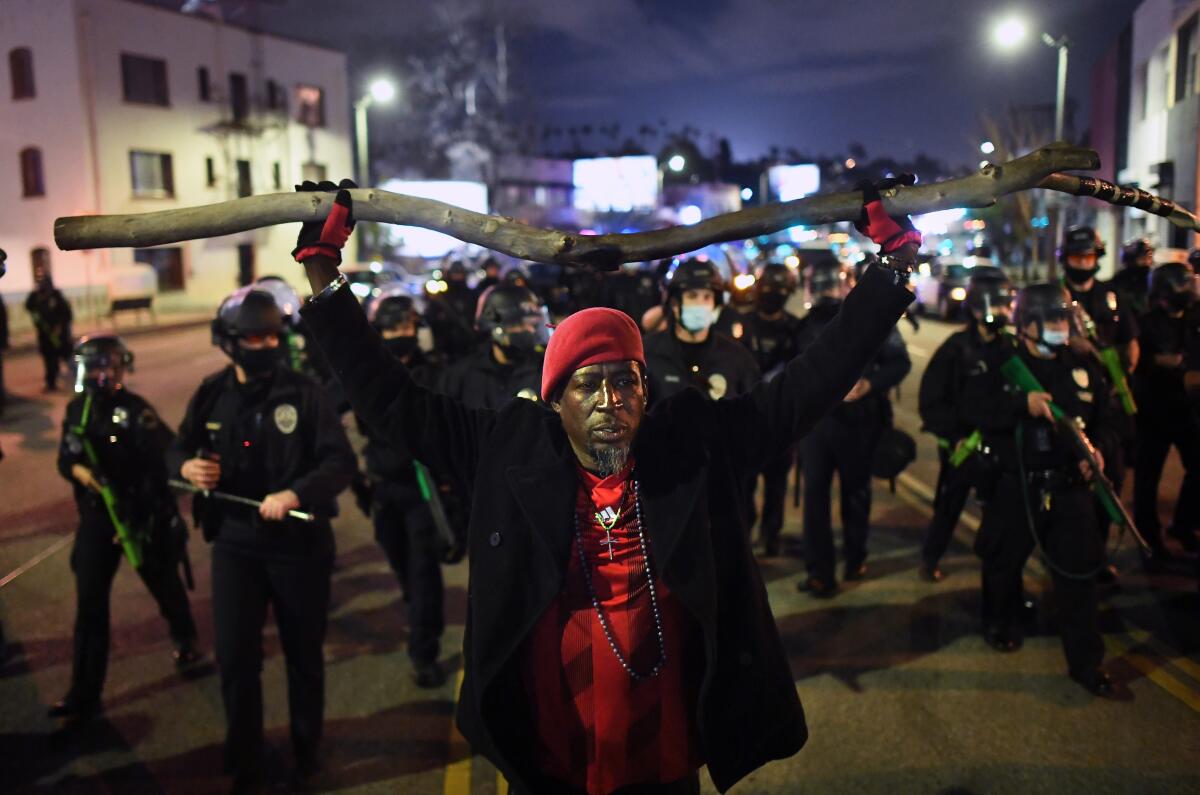
- Share via
Los Angeles City Council Members Mike Bonin and Nithya Raman want to know how much it cost to send in police last week as the city fenced off Echo Park and barred people from a homeless encampment along its scenic lake.
Bonin and Raman are pressing for answers from the Los Angeles Police Department on how much the Echo Park deployment cost — including officer pay, overtime costs, equipment and helicopter expenses — how it affected police patrols in other neighborhoods and why it was needed, as well as information on arrests, detentions and uses of force.
“There is tremendous public concern and consternation regarding this deployment,” the council members wrote.
The two council members did not introduce their request as a formal motion that would go up for a council vote. Instead, the request was issued as a letter to LAPD Chief Michel Moore. Bonin is also introducing a formal motion along with Councilman Kevin de León asking the LAPD to report back on the detention of journalists during the Echo Park protests.
That motion, which also cited earlier incidents in which a KPCC reporter was arrested by L.A. County sheriff’s deputies and the LAPD sought to charge an L.A. Taco reporter, also asks the department to detail its procedures for issuing and recognizing press credentials and to explain how it ensures reporters can freely cover demonstrations, citing complaints about reporters being ushered to a “press pen” far from the Echo Park protests they were trying to cover.
The public push for answers about the Echo Park operation is unusual because L.A. council members typically shy from weighing in on matters in other council districts.
Echo Park protesters and others allege police used excessive force, raising new questions about crowd control tactics.
Bonin and Raman had already voiced their dismay with the effort to close Echo Park Lake, which brought hundreds of police officers to the neighborhood as crews hustled to fence off the park by night. Outreach workers urged homeless people remaining in the park to accept offers for hotel rooms or other shelter before an impending deadline to leave.
Protesters were later arrested and journalists were detained. Officers were recorded on video using weapons in ways that appeared to violate department policies.
Last week, Raman said she was “powerfully saddened” by what she had witnessed. Bonin said it was “wrong and counter-productive” to deploy scores of officers in riot gear to the park.
Most people “have agreed police should not be used as a response to homelessness,” Bonin said in a statement. “A deployment of armed officers exacerbates tensions, forcing stand-offs and creating confrontations.”
A reporter who published a video alleging LAPD officers attacked him during World Series victory celebrations was charged with failure to disperse last month.
De León also weighed in last week, saying the LAPD needed to revisit how it deals with journalists.
Moore has defended the department’s handling of the protests, saying demonstrators were ordered to disperse only after officers faced violence and, on the second night, strobe lights were used to temporarily blind them.
Moore said that although the department had initially hoped to send out a “very minimal workforce,” officers were sent out in larger numbers amid posts on social media calling for protesters to “overrun the officers’ position and occupy the park, or destroy any fence, or prevent the fence from being installed.”
Councilman Mitch O’Farrell, who represents the Echo Park area, argued that the encampment was dangerous and the park needed to be temporarily closed for repairs. He rejected the idea that outreach efforts to homeless people had been “violent or police-led.”
When the city swiftly fenced off Echo Park and prodded people out of a sprawling camp that had taken root along its scenic lake, it was an extraordinary move in a city full of homeless encampments.
“I’m disappointed that some local elected officials, valuing politics over finding real housing solutions in their own districts, have sought to mischaracterize our successful work to house people,” O’Farrell said in a recent statement. “They have also wrongly conflated our efforts to house individuals with our larger conversations about police reform.”
As of Friday, the Los Angeles Homeless Services Authority said that more than 180 people from Echo Park Lake had been placed into some kind of shelter or housing — the majority of them in hotel rooms through Project Roomkey. O’Farrell has cited higher numbers; LAHSA had yet to provide an updated total as of Wednesday afternoon.
However, homeless activists stressed that the Project Roomkey rooms are only temporary and argued that the city had misused that resource — intended for the most vulnerable homeless people during the COVID-19 pandemic — for political reasons.
Despite the outreach effort, some former residents said they ended up on the streets or lost almost all of their belongings. At a news conference Tuesday on the steps of City Hall, Jessica Mendez pointed to a single bag.
“That purse is what I walked out with,” said Mendez, known in the encampment as the Queen of Echo Park. “That’s it.”
Reporters and legal observers sound alarms about their treatment during Echo Park arrests
Jed Parriott, an organizer with the activist group Street Watch L.A., argued that “the police were definitely involved in outreach” at Echo Park by telling people they would eventually have to leave or face arrest. He denied that his group or others had made any threats that would justify the police presence.
The divide at City Hall reflects an even starker one in Echo Park and across the city. Some Echo Park residents applauded the move to fence off the park, arguing that the growing encampment had prevented the broader public from enjoying the iconic green space. Thousands had signed a petition to “save our lake.”
“As a mother and resident of Echo Park, I can attest to the fact that the park ceased to be a public space in early 2020. At that point, the area became a private space that was permanently occupied and unfortunately an incredibly dangerous and unstable environment,” said one woman who phoned into the council meeting Wednesday.
Others railed against the decision.
An online petition has called for O’Farrell to resign; the homeless outreach and advocacy group Ktown for All joined those calls, saying the councilman had misled the public. A group of university professors also sent a letter denouncing the Echo Park closure as a “forced eviction” and arguing that it flouted federal guidelines for ensuring COVID-19 safety.
Times staff writer Kevin Rector contributed to this report.
More to Read
Sign up for Essential California
The most important California stories and recommendations in your inbox every morning.
You may occasionally receive promotional content from the Los Angeles Times.
